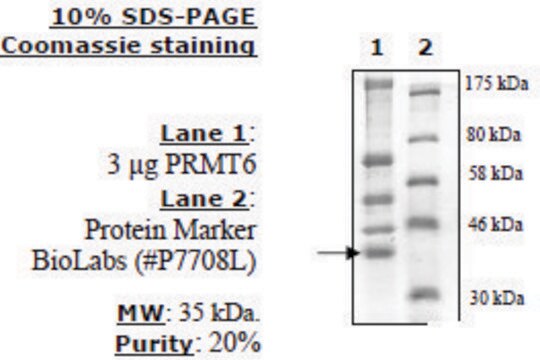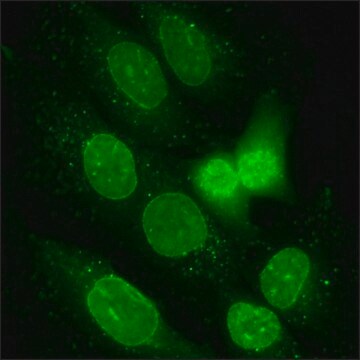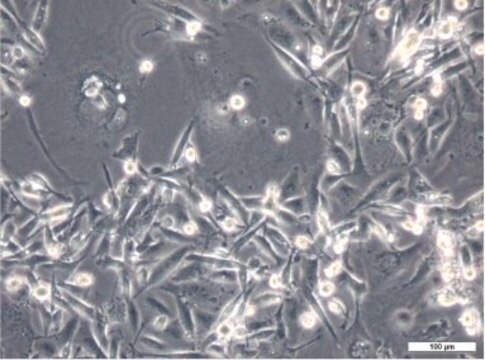PNT1A human
95012614, human prostate, Epithelial
Se connecterpour consulter vos tarifs contractuels et ceux de votre entreprise/organisme
About This Item
Code UNSPSC :
41106514
Produits recommandés
product name
PNT1A human, 95012614, Normal prostate epithelium imortalized with SV40.
Source biologique
human prostate
Mode de croissance
Adherent
Caryotype
Aneuploid
Morphologie
Epithelial
Produits
Not specified
Récepteurs
Dihydrotestosterone receptor
Technique(s)
cell culture | mammalian: suitable
Conditions d'expédition
dry ice
Température de stockage
−20°C
Origine de la lignée cellulaire
Human post pubertal prostate normal, immortalised with SV40
Description de la lignée cellulaire
Established by immortalisation of normal adult prostatic epithelial cells by transfection with a plasmid containing SV40 genome with a defective replication origin. The primary culture was obtained from the prostate of a 35 year old male at post mortem. The cells contain the SV40 genome and express large T protein. They present the phenotype of differentiated luminal prostatic cells with the expression of cytokeratin 8 and 18 (markers for luminal glandular epithelia) and vimentin. Cytokeratin14, a marker of epithelial basal cells, is not expressed. PNT1A cells are non-tumourigenic in nude mice.
Application
PNT1A has been used to determine the variation in metabolite levels of human DU145 prostate cancer and PNT1A cells after treatment with selenomethionine (SeM) and Se-methylselenocysteine (SeMSC). It has also been used to study the effects of angiotensin II (Ang II) and relaxin 2 (RLN2) on the viability, proliferation, adhesion, migration and invasion of PNT1A cells.
Study of proliferation, oncogene activation and differentiation of adult prostatic cells and initial steps leading to transformation.
Milieu de culture
RPMI 1640 + 2mM Glutamine + 6 -10% Foetal Bovine Serum (FBS).
Procédure de repiquage
Split sub-confluent cultures (70-80%) 1:3 to 1:10 i.e. seeding at 2-4x10,000 cells/cm2 using 0.25% trypsin or trypsin/EDTA; 5% CO2;37°C.
Autres remarques
Additional freight & handling charges may be applicable for Asia-Pacific shipments. Please check with your local Customer Service representative for more information.
Certificats d'analyse (COA)
Recherchez un Certificats d'analyse (COA) en saisissant le numéro de lot du produit. Les numéros de lot figurent sur l'étiquette du produit après les mots "Lot" ou "Batch".
Déjà en possession de ce produit ?
Retrouvez la documentation relative aux produits que vous avez récemment achetés dans la Bibliothèque de documents.
Notre équipe de scientifiques dispose d'une expérience dans tous les secteurs de la recherche, notamment en sciences de la vie, science des matériaux, synthèse chimique, chromatographie, analyse et dans de nombreux autres domaines..
Contacter notre Service technique







